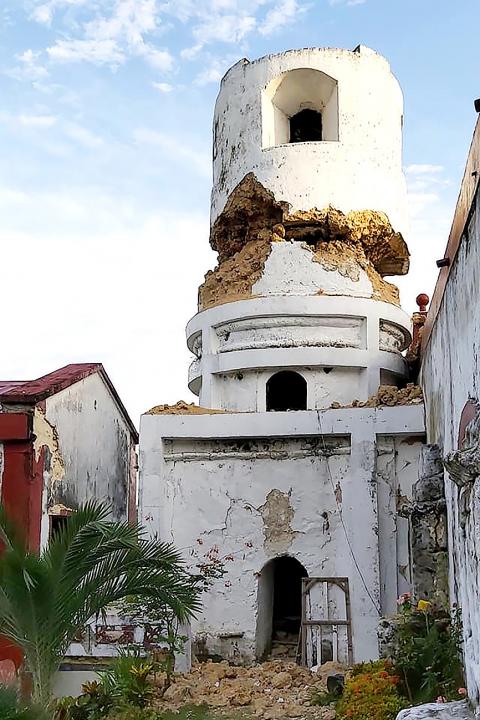Two strong earthquakes hours apart struck a group of sparsely populated islands in the Luzon Strait in the northern Philippines yesterday, killing at least eight people, injuring about 60 and damaging ancestral houses.
The quakes collapsed homes of stone and wood and roused residents from sleep, said Roldan Esdicul, who heads the Batanes provincial disaster-response office.
Footage showed people clearing boulder-size stone bricks to pull out one body from the rubble.

Photo: AFP / Courtesy of Dominic de Sagon
“Our bed and everything were swaying from side to side like a hammock,” Esdicul told reporters by cellphone from Basco town, the provincial capital. “We all ran out to safety.”
On hard-hit Itbayat island, schoolteacher Agnes Salengua-Nico said she and her husband woke up horrified with the ground shaking and a cabinet crashing to the floor.
Their house withstood the shaking, but others in the neighborhood crumbled, pinning residents inside, she said.
“We’re out now in the farm with our three pigs because we’re very, very scared of the aftershocks,” she told reporters by phone, her voice trembling shortly after the ground shook again.
More than 2,000 residents of Itbayat — nearly all of the island’s population of mostly fishers — were advised not to return to their homes and stay in the town plaza as successive aftershocks shook the region, Esdicul said.
Only one villager remained missing in the quake’s aftermath, he said.
Army troops and additional doctors later flew in after Itbayat’s airport runway was declared safe.
The quakes measured magnitudes 5.4 and 5.9 at relatively shallow depths, the Philippine Institute of Volcanology and Seismology said.
A third magnitude 5.8 quake struck at sea west of Batanes later yesterday, it said.
Esdicul said he was already in his office with the provincial governor when the second and more powerful quake struck about three hours after the first shock.
“We have to hold on because you can’t stand or walk. It was that strong,” he said.
The initial quake severely cracked the bell tower of the island’s old limestone church, the 19th-century Santa Maria de Mayan, a popular tourist attraction. The tower crumbled down when the second temblor hit the island, he said.
A one-story hospital was damaged, prompting patients to be evacuated and brought out in the open with dozens of people injured in the quakes. Some were later crammed into a basketball court with a roof due to heavy rain, Esdicul said.
Seven of those injured who sustained serious fractures were airlifted out of Itbayat to a bigger provincial hospital, he said.
Itbayat, part of the country’s northernmost Batanes Islands, has a population of about 2,800 people and lies in the Luzon Strait that separates Taiwan and the Philippines. The islands are famous for their tiny ancestral stone houses with coral walls and cogon grass roofs and are often lashed by seasonal typhoons.
As the quake jolted Batanes, thousands of residents were holding a pre-dawn earthquake drill about 250km to the south in metropolitan Manila, which was not affected by the quake.
Some journalists asked why the drills needed to be held so early in the morning, said Renato Solidum, a prominent seismologist and disaster-response expert who helped lead the drills.
When the earthquake hit Batanes shortly after, it helped officials underscore the fact that disaster can strike any time, Solidum said.

VENEZUELAN ACTION: Marco Rubio said that previous US interdiction efforts have not stemmed the flow of illicit drugs into the US and that ‘blowing them up’ would US President Donald Trump on Wednesday justified a lethal military strike that his administration said was carried out a day earlier against a Venezuelan gang as a necessary effort by the US to send a message to Latin American cartels. Asked why the military did not instead interdict the vessel and capture those on board, Trump said that the operation would cause drug smugglers to think twice about trying to move drugs into the US. “There was massive amounts of drugs coming into our country to kill a lot of people and everybody fully understands that,” Trump said while hosting Polish President

China on Monday announced its first ever sanctions against an individual Japanese lawmaker, targeting China-born Hei Seki for “spreading fallacies” on issues such as Taiwan, Hong Kong and disputed islands, prompting a protest from Tokyo. Beijing has an ongoing spat with Tokyo over islands in the East China Sea claimed by both countries, and considers foreign criticism on sensitive political topics to be acts of interference. Seki, a naturalised Japanese citizen, “spread false information, colluded with Japanese anti-China forces, and wantonly attacked and smeared China”, foreign ministry spokesman Lin Jian told reporters on Monday. “For his own selfish interests, (Seki)

Japan yesterday heralded the coming-of-age of Japanese Prince Hisahito with an elaborate ceremony at the Imperial Palace, where a succession crisis is brewing. The nephew of Japanese Emperor Naruhito, Hisahito received a black silk-and-lacquer crown at the ceremony, which marks the beginning of his royal adult life. “Thank you very much for bestowing the crown today at the coming-of-age ceremony,” Hisahito said. “I will fulfill my duties, being aware of my responsibilities as an adult member of the imperial family.” Although the emperor has a daughter — Princess Aiko — the 23-year-old has been sidelined by the royal family’s male-only

A French couple kept Louise, a playful black panther, in an apartment in northern France, triggering panic when she was spotted roaming nearby rooftops. The pair were were handed suspended jail sentences on Thursday for illegally keeping a wild animal, despite protesting that they saw Louise as their baby. The ruling follows a September 2019 incident when the months-old feline was seen roaming a rooftop in Armentieres after slipping out of the couple’s window. Authorities captured the panther by sedating her with anesthetic darts after she entered a home. No injuries were reported during the animal’s time on the loose. The court in the